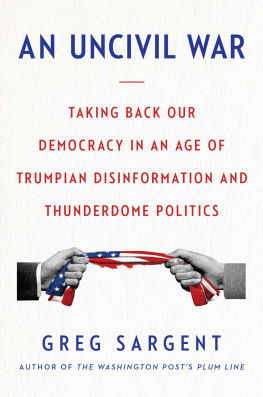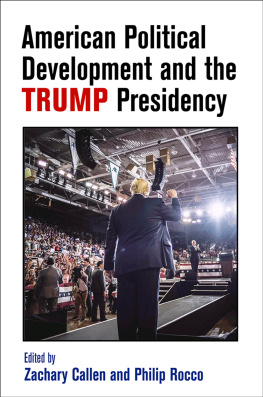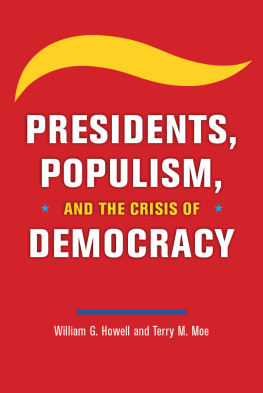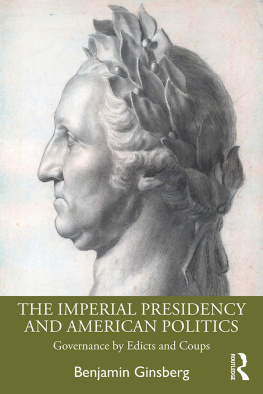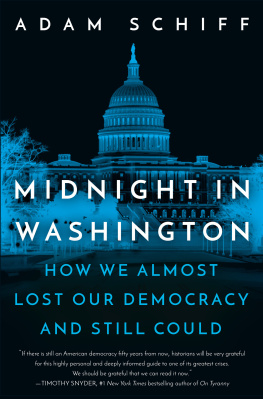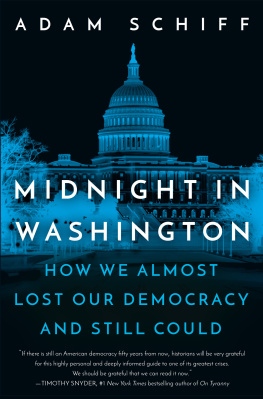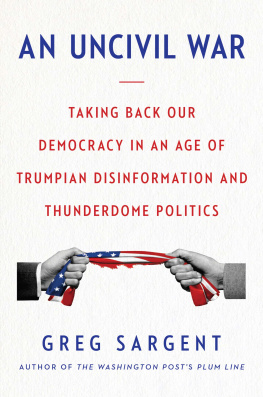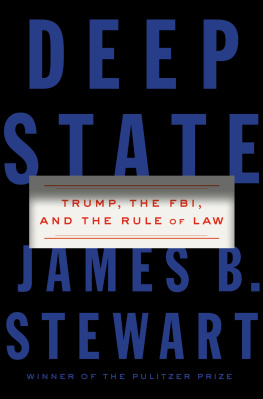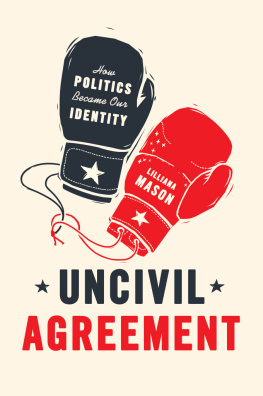W e are living through an exceptionally fraught period in the political life of this country. And at its core is a dangerous paradox.
On the one hand, the ascension of Donald Trump to the presidency has sparked an outpouring of fear, anxiety, and introspection about the state of our democracy that is rivaled by nothing in recent memory. The Trump era intuitively feels to many of us as if it is saturated with a level of peril to our political system, and to the rights, liberties, and stability it guarantees, that elevates the present moment to one of profound historical consequence. It feels comparable to, say, how we now look back on the Watergate era in the 1970s; the tumult over civil rights and the Vietnam War and the urban riots and assassinations of the 1960s; or the rise of demagogue Senator Joe McCarthy in the 1950s. Trumps rise has unleashed a profound sense among both elites and well-informed rank-and-file votersand among many citizens who were previously uninterested in political participation but suddenly find themselves more actively engaged than at any other point in their livesthat our democracy and its core institutions are under serious stress at best, and face profound or even existential peril at worst.
At the same time, the very fact that it required the rise of a singularly demagogic and menacing figure like Trump to rivet the nations attention on the state of our democracy is itself a serious problem. To be sure, the current occupant of the Oval Office is a serial despoiler of our political system. But the plight of our democracy is the result of a series of deep structural factors and problems that go well beyond Trump, and long predate him. These problems both helped produce Trumps rise and are an essential reason this Trumpian moment is so perilous. The fact that Trump himself is the intense focal point of much of the nations anxiety about our democracythat it required Trumps rise to awaken our attention to the degree that it hasis symptomatic of a long-running failure to adequately grasp those problems as a cause for serious worry on their own terms.
Trump does, of course, seem to personally embody a series of challenges to our democracy that few of us expected to see in our lifetimes. His authoritarian and autocratic instinctswhich he continues to unabashedly display in countless tweets, public pronouncements, and actionsare very real. They have represented a grave threat ever since his rise began, and continue to menace our political system in a manner whose consequences remain unpredictable. Throughout the 2016 campaign, Trump viciously attacked the foundational institutions of liberal democratic governancethe free press, the judiciary, the career government professionals whose technocratic expertise sustains the modern bureaucratic state. He campaigned heavily on the notion that our democratic processes themselves can no longer render legitimate outcomes. He attacked our elections as rigged and riddled with fraud, sometimes even suggesting that U.S. officials themselves were complicit in their corruption. He flatly threatened to treat the elections outcome as invalid if he lost, thus hinting that in that event he might try to disrupt the peaceful transfer of power, a hallmark of democratic stability. Trump buttressed that narrative by threatening to jail his opponent, telegraphing to his supporters that if Hillary Clinton prevailed, her presidency would be a criminal usurpation. His top campaign advisersincluding those who are also close family membersdemonstrated their willingness to collude with a hostile foreign power to influence the outcome of the election, in effect calling on a foreign adversary to undermine his legitimate political opponent, the nominee of one of the two major American political parties, through weaponized cyber subterfuge.
No sooner had Trump assumed office than his offensive against the institutions of our liberal democracy, if anything, escalated. Alarmingly, those attacks appeared to be a direct response to his increasing recognition that they were functioning properlyas checks on his power. These attacks on the judiciary have continued, and his assaults on the media have taken on the cast of a systematic campaign to undermine the free presss institutional role in our democracy. He has also trampled all sorts of other democratic norms, including refusing to release his tax returns, brushing off a self-imposed standard of transparency that presidential candidates have followed for decades. (Compounding insult and injury to voters, in late 2017 he signed a tax reform package that showered enormous benefits on the wealthy, yet voters were unable to determine the worth of the benefits it lavished upon himself and his family, which likely amounted to savings of millions of dollars at a minimum.
The list goes on: Trump fired his FBI director and admitted on national television that hed done it out of anger over the ongoing FBI investigation of his campaigns alleged collaboration with Russias efforts to sabotage the 2016 presidential election on his behalf.
To be sure, its a stretch to say that our democracy is substantially eroding when compared to other previous periods throughout our history. Certain aspects of it are eroding relative to recent years, but when you take the longer view, there have of course been periods during which things were far, far worse than they are nowperiods in which corruption or civil rights abuses were rampant; periods consumed with bloody political violence, not to mention civil war; periods during which democracy simply didnt exist at all for large swaths of the population. Whats more, there are reasons to be optimistic that our institutions are, while battered and black-eyed, largely holding up in the face of Trumps degradations. Yet the tally of damage that the Trump era has wroughtand continues to inflicton our political system is simply staggering. And when most of us think about our current political moment, we think mainly about all of these Trumpian degradations. But the very fact that we have seen this sudden pileup of burdens itself hints that focusing only on Trump as the catalyst is highly insufficient. How is it possible that one man could suddenly step forward and single-handedly subject our democracy to so much stress and potential peril?
The answer to that question has less to do with Donald Trump than the constant crush of anguished media attention to every Trumpian rage-tweet, racist slur, authoritarian-accented threat, and expression of seething contempt for our institutions makes it seem.
Democratic Backsliding
In each national election, tens of millions of us go to the polls and choose a number of people to represent us in the national government. The story we tell ourselves about this ritual is fairly straightforward. We have spent days or weeks or months leading up to election day evaluating the public statements and policy positions of competing candidates, delivered to us by our preferred news media and information sources, most of which (we have generally believed) are making a good-faith effort to inform us about the choice we face. Generally speaking, many of us cast a ballot in the firm expectation that each of our votes will carry equal weight, and that the candidate or party that receives a majority of votes will prevail. If more Americans cast their vote for Democratic candidates for the House of Representatives, then the Democratic Party will control that chamber of Congress; if more Americans vote for Republicans, then the Republican Party will control it. The same, many of us assume, goes for our state and local legislatures. While there have been plenty of individual instances in which the party that narrowly received the most votes ultimately fell short of winning control of the legislative body in question, surely many voters have not traditionally thought of this as typical. And while its true that the president is selected by the Electoral College, a lot of Americans likely regard this as largely an anachronism, and have generally anticipated that the winner will almost always be the one who captures the most votes. In short, many of us have long viewed our democracy as, generally speaking, a flawed but functional and fair system of majority rule. But many analysts had begun to warneven well in advance of Trumps appearance on the political scene, back when most Americans were only dimly aware of Trump as a distant, shriveled, cartoonish reality-TV figure, if they knew of him at allthat the story we tell ourselves about our political system is growing more difficult to sustain, due to a confluence of factors.

